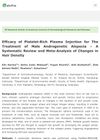 3 citations,
April 2022 in “Dermatologic Surgery”
3 citations,
April 2022 in “Dermatologic Surgery” Light therapy with various colors helps treat hair loss.
 2 citations,
June 2023 in “Skin Research and Technology”
2 citations,
June 2023 in “Skin Research and Technology” Yellow dots and short vellus hairs are the most common signs of Alopecia Areata (AA), and trichoscopy can help diagnose AA and track treatment progress.
 2 citations,
October 2021 in “Asian Journal of Andrology”
2 citations,
October 2021 in “Asian Journal of Andrology” Medications for hair loss and prostate issues can significantly increase the risk of sexual side effects and other negative symptoms.
[object Object] 1 citations,
January 2023 in “PubMed” PRP might help with hair growth, but the evidence is weak.
1 citations,
August 2022 in “Journal of Drugs in Dermatology” More frequent PRP sessions with shorter intervals improve hair loss treatment.
 October 2024 in “Frontiers in Nutrition”
October 2024 in “Frontiers in Nutrition” Vitamin D deficiency is common in people with certain types of hair loss, like alopecia areata and female pattern hair loss.
 August 2024 in “Skin Research and Technology”
August 2024 in “Skin Research and Technology” PRP is an effective and safe treatment for female hair loss.
July 2024 in “Anais Brasileiros de Dermatologia” PRP injections can increase hair density in people with androgenic alopecia.
 November 2023 in “Journal of Cosmetic Dermatology”
November 2023 in “Journal of Cosmetic Dermatology” People with non-scarring hair loss often have lower vitamin D levels than those without hair loss.
 August 2023 in “Skin Research and Technology”
August 2023 in “Skin Research and Technology” Platelet-rich plasma (PRP) may improve healing in chronic wounds and vitiligo and promote hair regrowth, but more research is needed.

Oral spironolactone may be effective for female pattern hair loss with a low rate of side effects.
 June 2023 in “Journal of Cosmetic Dermatology”
June 2023 in “Journal of Cosmetic Dermatology” Finasteride 5mg daily is the most effective for female pattern hair loss, with higher doses of treatments generally more effective.
 January 2023 in “Journal of cosmetic dermatology”
January 2023 in “Journal of cosmetic dermatology” Fractional lasers effectively treat alopecia areata, especially when combined with minoxidil or cortisol.
December 2022 in “Plastic and Reconstructive Surgery” PRP is an effective and safe treatment for hair loss.
87 citations,
December 2015 in “Cochrane library” No single treatment is clearly effective for central serous chorioretinopathy.
 25 citations,
February 2022 in “JAAD International”
25 citations,
February 2022 in “JAAD International” Some COVID-19 patients lose hair, with the most common type linked to male hormones and possibly increasing the risk of severe illness.
23 citations,
February 2021 in “Dermatologic therapy” Some treatments like pentoxifylline with topical corticosteroids might work for alopecia areata, but more research is needed to find the best one.
15 citations,
December 2021 in “Pharmaceutics” The study found key factors in the cause of hidradenitis suppurativa, its link to other diseases, and identified existing drugs that could potentially treat it.
7 citations,
May 2021 in “Frontiers in Pharmacology” PRP shows promise for treating female hair loss but needs more research.
6 citations,
October 2021 in “Biomedical Research and Therapy” Alopecia areata patients have higher levels of IL-6 and TNF-α.
4 citations,
October 2023 in “Journal of clinical medicine” Women with PCOS are much more likely to experience depression.
 4 citations,
November 2022 in “Frontiers in Medicine”
4 citations,
November 2022 in “Frontiers in Medicine” People with alopecia areata are more likely to have anxiety and depression and a lower quality of life.
3 citations,
December 2021 in “Acta dermato-venereologica” People with androgenetic alopecia have a higher risk of metabolic syndrome.
 2 citations,
September 2023 in “Health science reports”
2 citations,
September 2023 in “Health science reports” People with certain skin conditions, especially androgenic alopecia, are more likely to have metabolic syndrome.
[object Object]  1 citations,
March 2023 in “Frontiers in Medicine”
1 citations,
March 2023 in “Frontiers in Medicine” Topical prostaglandin analogs may help with hair growth but more research is needed.
1 citations,
October 2022 in “Evidence-based Complementary and Alternative Medicine” Traditional Chinese Medicine may help treat hair loss but needs more research.
 January 2025 in “Journal of Dermatological Treatment”
January 2025 in “Journal of Dermatological Treatment” Combining low-level laser therapy with minoxidil doesn't improve hair loss treatment compared to using minoxidil alone.
 December 2024 in “Journal of Clinical Medicine”
December 2024 in “Journal of Clinical Medicine” Minoxidil shows promise for alopecia areata, but more research is needed before it can be recommended as a primary treatment.
 October 2023 in “The Cochrane library”
October 2023 in “The Cochrane library” The medicine baricitinib was found to notably improve hair regrowth in alopecia areata, but more research is needed on its side effects and other treatments.

Platelet-rich plasma injections effectively increase hair density in men suffering from common hair loss.


















